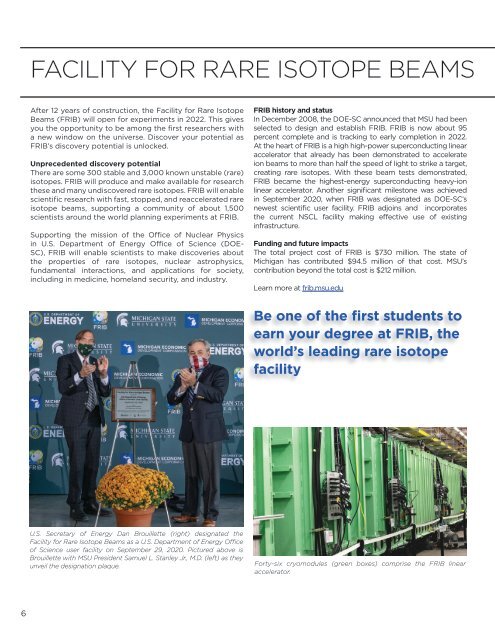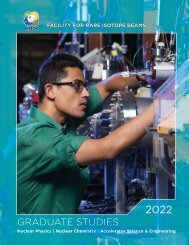2021FRIB/NSCL Graduate Brochure
Create successful ePaper yourself
Turn your PDF publications into a flip-book with our unique Google optimized e-Paper software.
FACILITY FOR RARE ISOTOPE BEAMS<br />
After 12 years of construction, the Facility for Rare Isotope<br />
Beams (FRIB) will open for experiments in 2022. This gives<br />
you the opportunity to be among the first researchers with<br />
a new window on the universe. Discover your potential as<br />
FRIB’s discovery potential is unlocked.<br />
Unprecedented discovery potential<br />
There are some 300 stable and 3,000 known unstable (rare)<br />
isotopes. FRIB will produce and make available for research<br />
these and many undiscovered rare isotopes. FRIB will enable<br />
scientific research with fast, stopped, and reaccelerated rare<br />
isotope beams, supporting a community of about 1,500<br />
scientists around the world planning experiments at FRIB.<br />
Supporting the mission of the Office of Nuclear Physics<br />
in U.S. Department of Energy Office of Science (DOE-<br />
SC), FRIB will enable scientists to make discoveries about<br />
the properties of rare isotopes, nuclear astrophysics,<br />
fundamental interactions, and applications for society,<br />
including in medicine, homeland security, and industry.<br />
FRIB history and status<br />
In December 2008, the DOE-SC announced that MSU had been<br />
selected to design and establish FRIB. FRIB is now about 95<br />
percent complete and is tracking to early completion in 2022.<br />
At the heart of FRIB is a high high-power superconducting linear<br />
accelerator that already has been demonstrated to accelerate<br />
ion beams to more than half the speed of light to strike a target,<br />
creating rare isotopes. With these beam tests demonstrated,<br />
FRIB became the highest-energy superconducting heavy-ion<br />
linear accelerator. Another significant milestone was achieved<br />
in September 2020, when FRIB was designated as DOE-SC’s<br />
newest scientific user facility. FRIB adjoins and incorporates<br />
the current <strong>NSCL</strong> facility making effective use of existing<br />
infrastructure.<br />
Funding and future impacts<br />
The total project cost of FRIB is $730 million. The state of<br />
Michigan has contributed $94.5 million of that cost. MSU’s<br />
contribution beyond the total cost is $212 million.<br />
Learn more at frib.msu.edu<br />
Be one of the first students to<br />
earn your degree at FRIB, the<br />
world’s leading rare isotope<br />
facility<br />
U.S. Secretary of Energy Dan Brouillette (right) designated the<br />
Facility for Rare Isotope Beams as a U.S. Department of Energy Office<br />
of Science user facility on September 29, 2020. Pictured above is<br />
Brouillette with MSU President Samuel L. Stanley Jr., M.D. (left) as they<br />
unveil the designation plaque.<br />
Forty-six cryomodules (green boxes) comprise the FRIB linear<br />
accelerator.<br />
6






